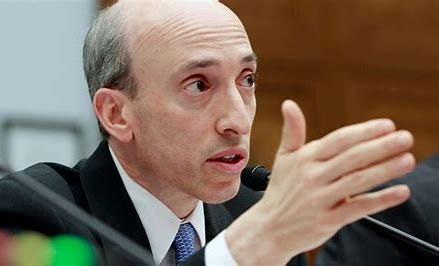Coinbase, the number two cryptocurrency exchange in the world, is thinking of shuttering its US operations.
That’s really significant, since it derives 84% of its revenue from US customers.
But why?
According to CEO and co-founder Brian Armstong, the company is frustrated over the lack of clear regulations for the crypto industry in the US. In particular, Armstrong cited conflicting rules and statements by the SEC and the Commodity Futures Trading Commission (CFTC), which regulates commodities. The SEC regulates securities.
SEC’s “non-existent registration process”
After the House Committee on Financial Services grilled SEC Chair Gary Gensler, several members penned a letter to Gensler which echoed the concerns of Coinbase and other exchanges.
The letter read, in part, “your push for firms to ‘come in and register’ is a willful misrepresentation of the SEC’s non-existent registration process. The only entity to blame for lack of registrants is the SEC itself.”
Several members of Congress have called for Gensler to be ousted from his post.
Ouch.
Gensler has previously stated his position that most every cryptocurrency, except Bitcoin, should be classified as a security, since they involve founders and a business with a profit goal from selling coins. Bitcoin, being totally decentralized, would not fall into this class.
But what about Ethereum? It would seemingly fall into the securities class, but so far Gensler has refused to say whether Ethereum is a secutity or nor. Even when questioned by Congress.
And that is what has crypto exchanges so upset witht the regulatory environment for their industry in the US. Uncertainty. No clarity. No clear path to being registered. No certainty that they are abiding by the laws of the country.
Impending Legal Actions
Coinbase was served with a “Wells Notice” by the SEC in March. A Wells Notice is a warning of impending legal action against the company. So far, however, the SEC has given no clue of what that action may look like.
On Monday, the SEC also filed a lawsuit against Bittrex, another cryptocurrency exchange. Before the filing, however, Bittrex had begun winding down its US operations, pointing to, in the company’s words, “the current US regulatory and economic environment.”
Bittrex CEO Richie Lai spoke out on the lack of clarity for the industry, saying the US is “seemingly committed to extinguishing the industry and sending it overseas.”
Kraken co-founder Jesse Powell echoed the sentiments of other companies, saying his company has considering leaving the US due to lack of regulatory clarity.
Thus far, the SEC has brought actions against 75 crypto companies in the US.
Would Coinbase Really Leave, and Where To?
Coinbase, a publicly held company (COIN), is currently the second-largest exchange in the world, with 110 million users and over $80 billion in assets on their platform. This puts them a distant second to Binance, but still a significant force in the industry.
The company operates as a truly remote operation, with no central headquarters. As such, there would be no big action like moving their headquarters. Further, with 84% of revenue coming from US customers, locating their operations outside the US wouldn’t affect their being subject to US regulators. Is Armstrong making a threat? Maybe. It doesn’t seem that Gensler would care.
Powell, of Kraken, says he believes that Tokyo and the United Arab Emerites would make good homes for his exchange.
Coinbase has expanded its operations in Brazil and in Singapore, so maybe those locales could be candidates for relocating the Coinbase operations? Coinbase has also received a license to operate in Bermuda, considered a haven for the industry. (Remember FTX?)
Coinbase’s secong-largest market is the United Kingdom. The UK and the European Union have generally been considered better homes for the crypto industry, due to more clarity in the regulatory environment.
Here’s the Clarity We Do Have
What we know right now is this:
Neither the SEC or the CFTC is clear on who should regulate what.
Crypto companies are frustrated over the lack of clear regulations.
Congress is turning up the heat on the regulatory agencies.
The US has one chance to get this right, to provide a regualtory framework and support a growing industry. An industry that could change the world’s financial system. They shouldn’t let it slip away.
Keep an eye on this issue; it’s bound to heat up later this year. And thanks for reading.
Bitcoin Tools, Platforms, Podcasts:
Twitter - Follow The Bitcoin Files on Twitter at @BitcoinNewslet1 for all of my articles, commentary and links to my contributions to Bitcoin Magazine.
Medium - Check out my writings on Medium, including articles not featured in the newsletter. Join my 600 other followers who read and write about crypto. medium.com/@rickmulvey
Podcasts - To hear the top names in Bitcoin, and learn more than you could imagine, check out The Pomp Podcast with Anthony Pompliano, What Bitcoin Did with Peter McCormack, and The Wolf of All Streets Podcast with Scott Melker.
Issue No. 105, April 21, 2023
Rick Mulvey is a CPA, crypto consultant, and frequent contributor to Bitcoin Magazine. He writes about all things Bitcoin, and yells at the Yankees and Giants. He also runs marathons and makes wine, neither professionally.







"That’s really significant, since it derives 84% of its revenue from US customers."
This indicates that leaving America will really be the last option Brian Armstrong will choose. It would mean the end of Coinbase for all intents and purposes or a complete change of its current business model.